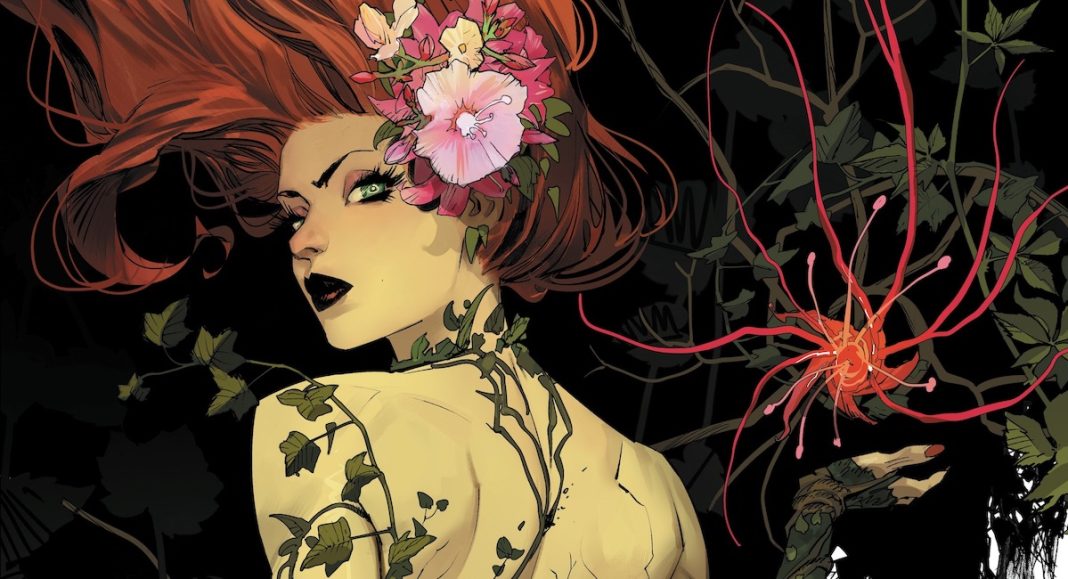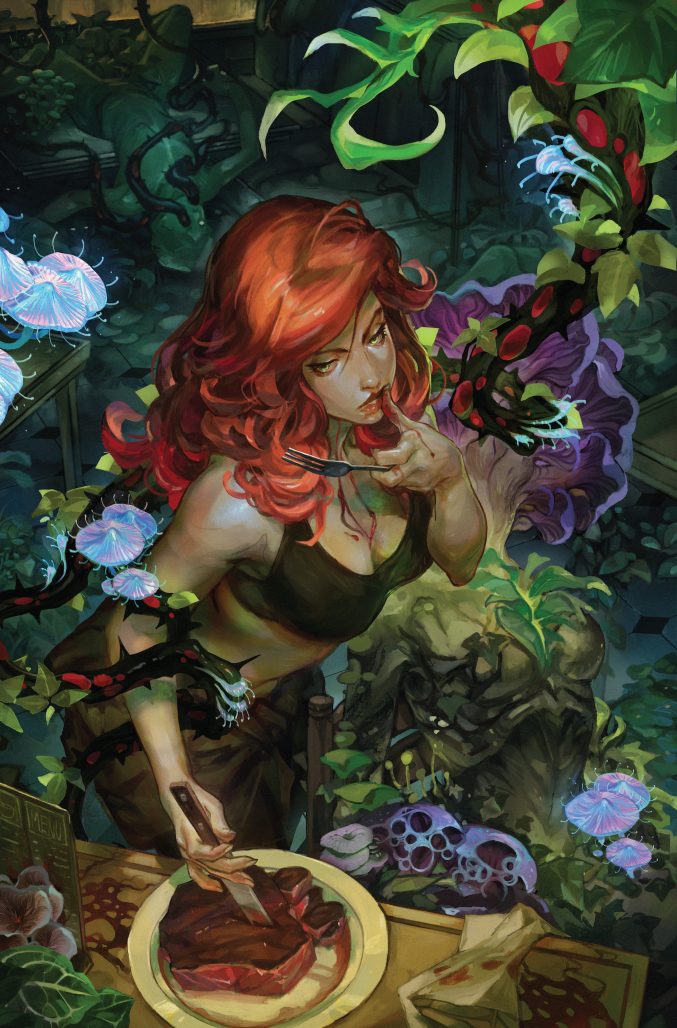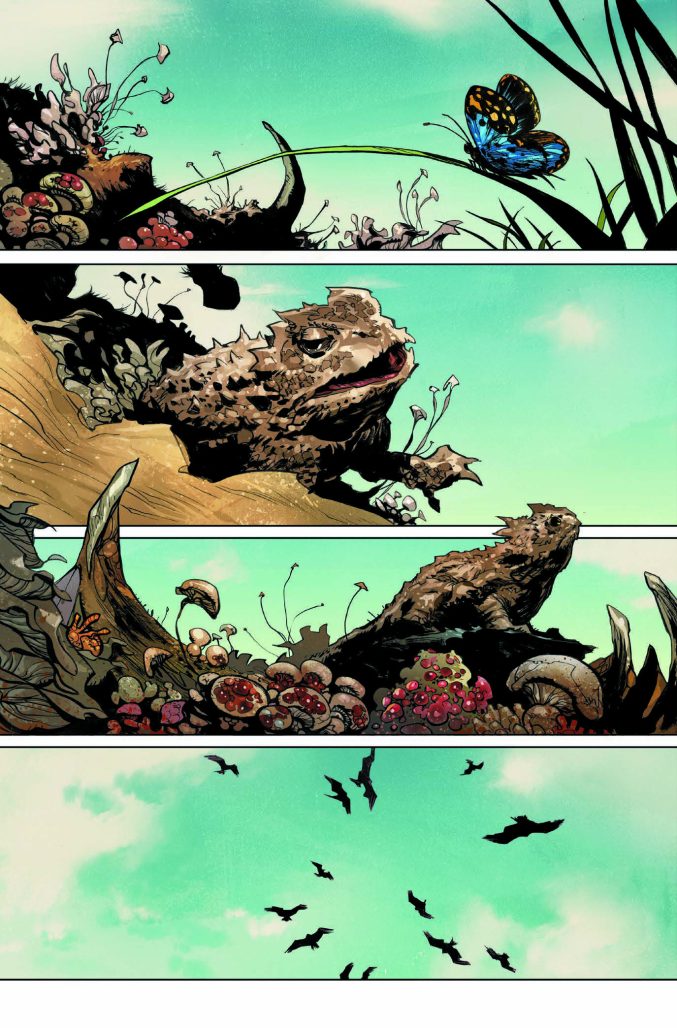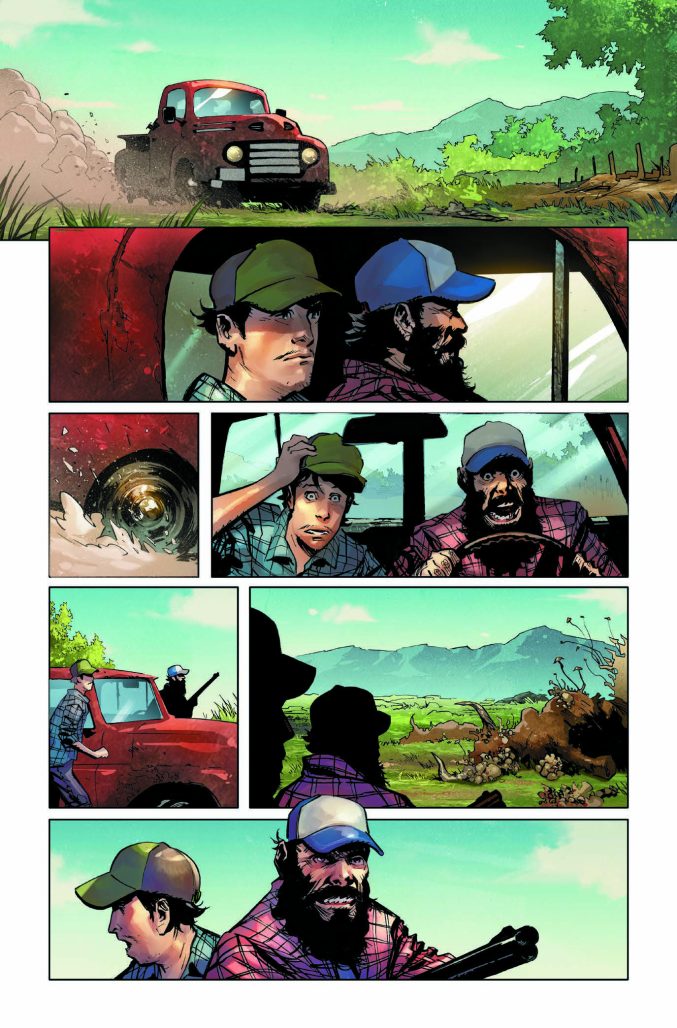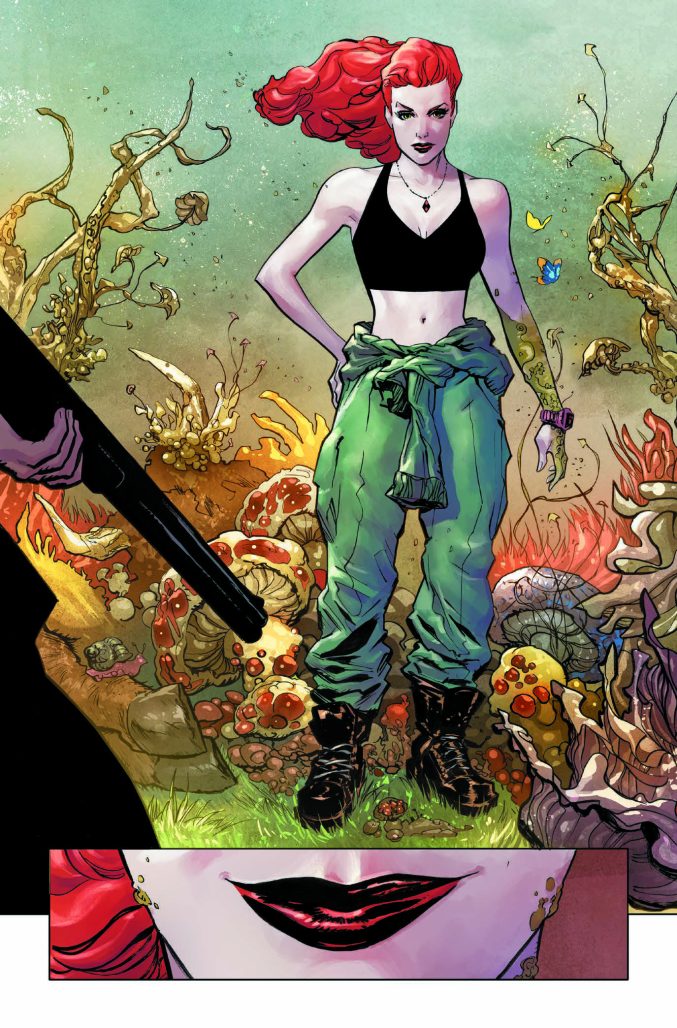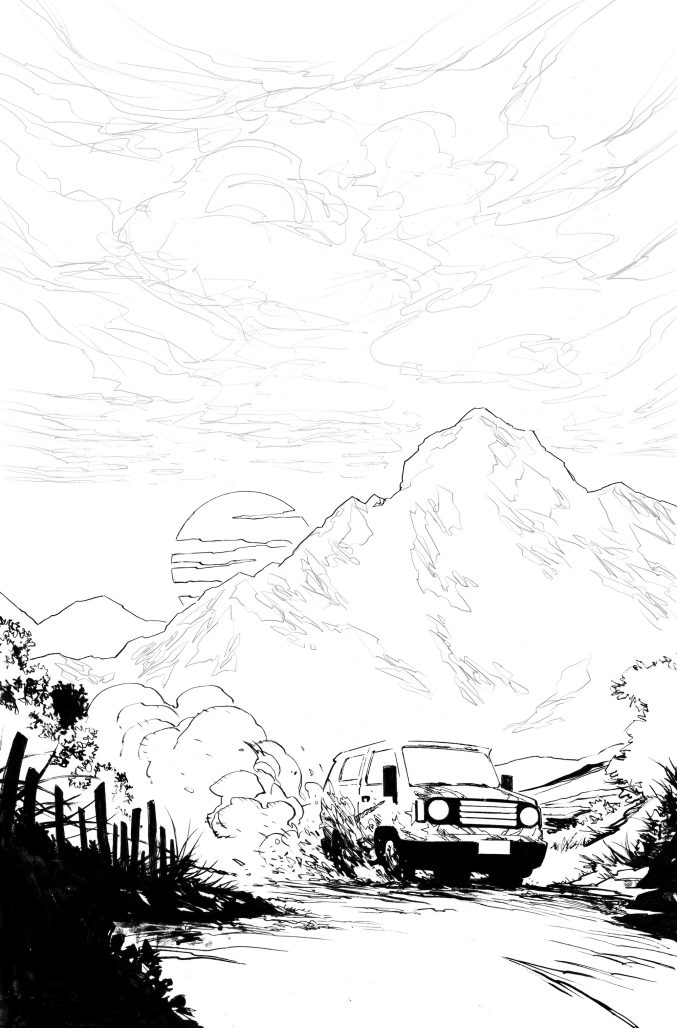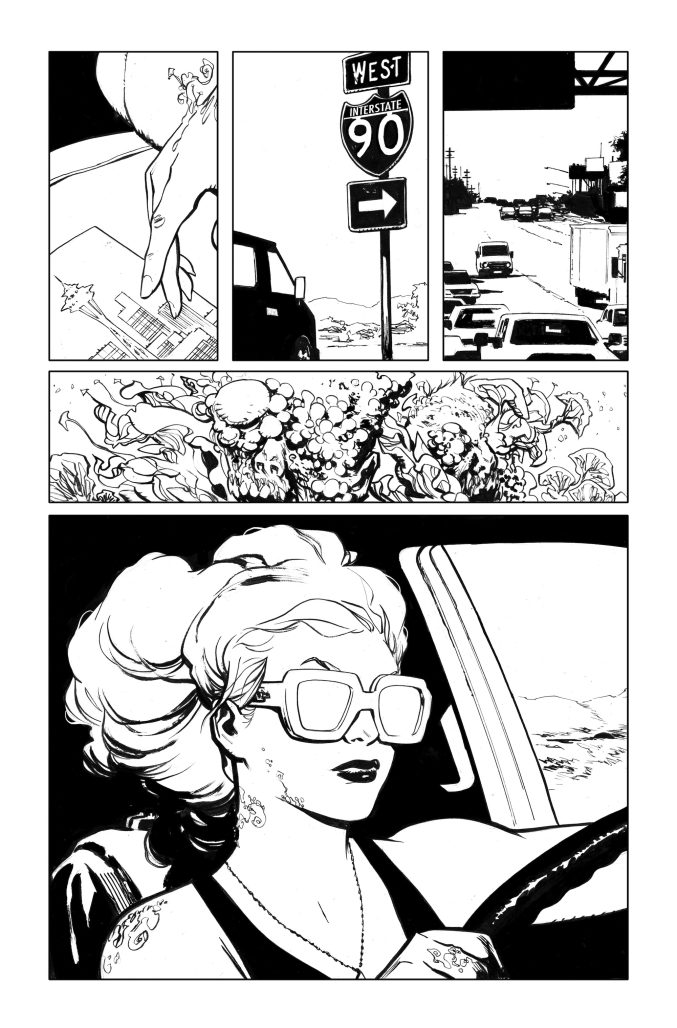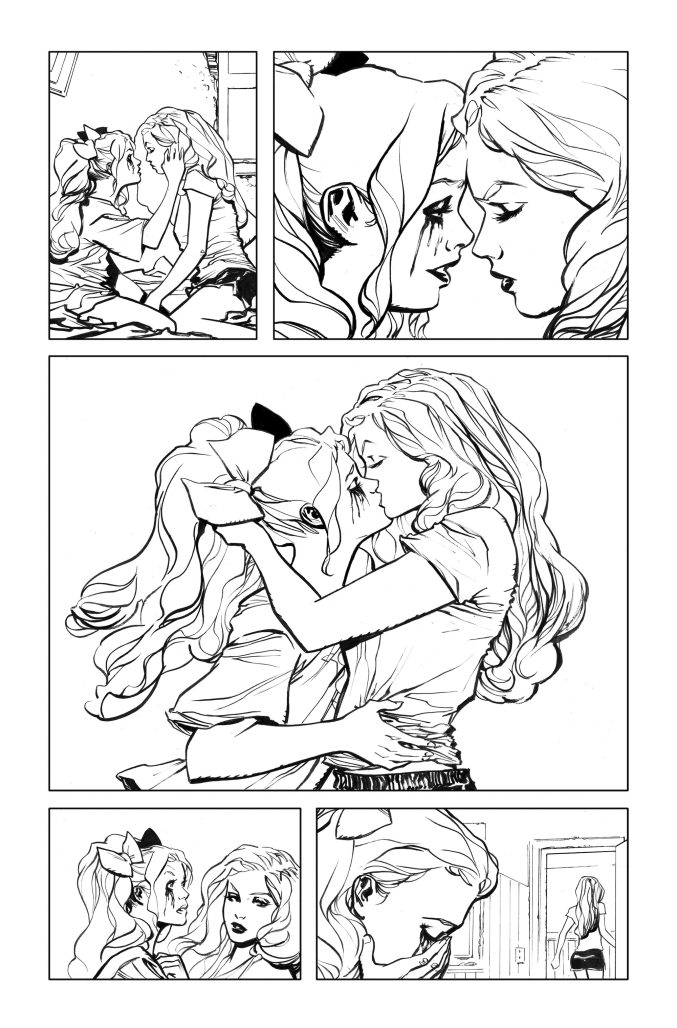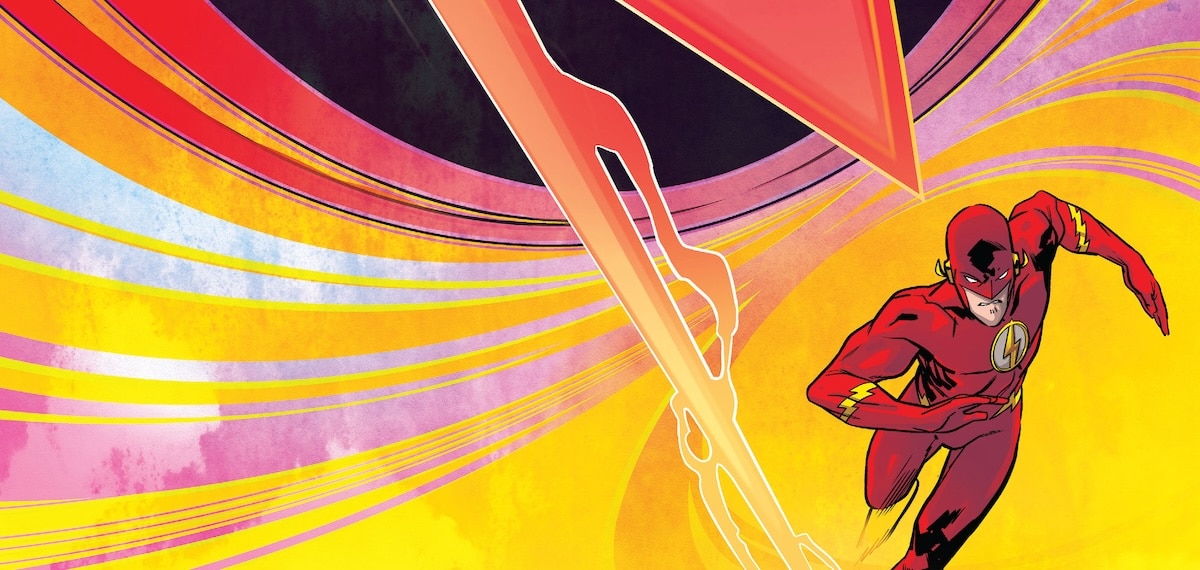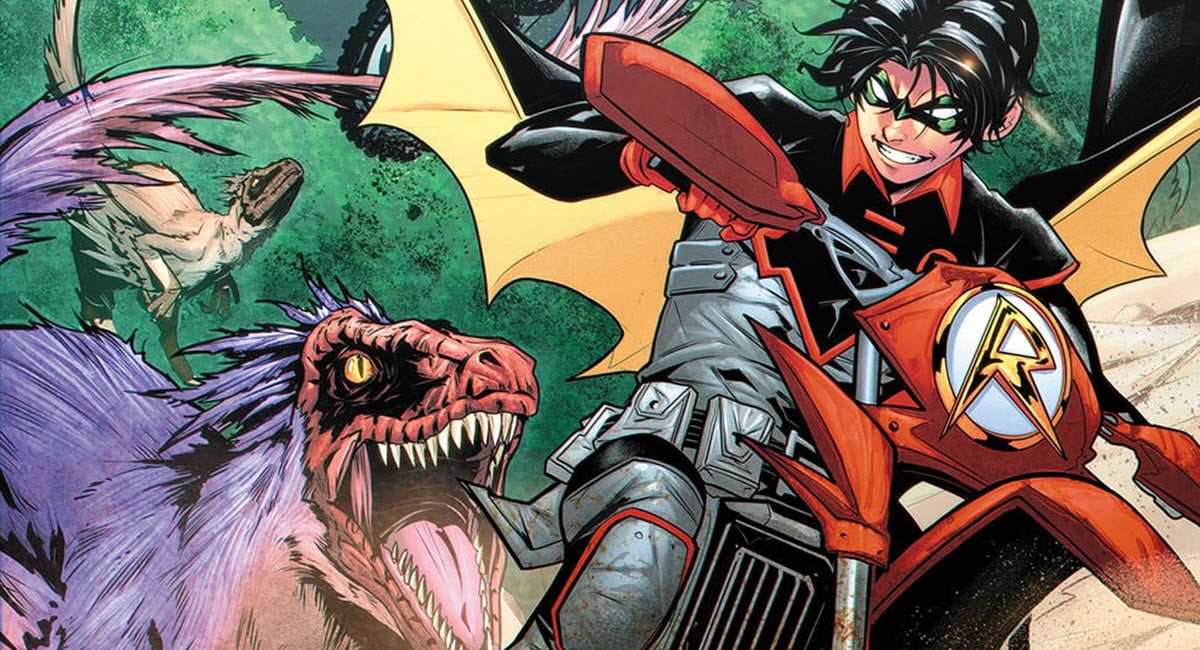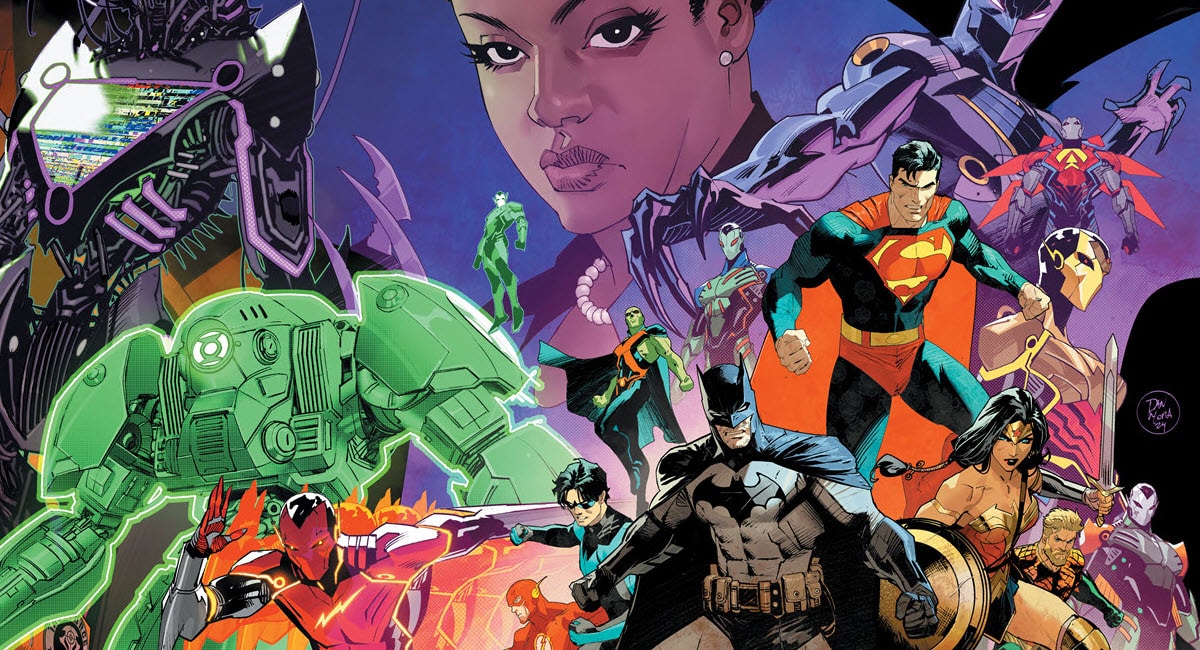Last month DC Comics announced a new six-issue Poison Ivy miniseries will debut in June. The series is written by G. Willow Wilson, illustrated by Marcio Takara, colored by Arif Prianto, lettered by Hassan Otsmane-Elhaou, and features covers by newcomer Jessica Fong. The series, as described by DC, finds Ivy on a final mission to save the world by destroying humanity once and for all.
The new Poison Ivy series picks up after a tumultuous time for the character, who has played central roles in recent books like Heroes in Crisis and the “Fear State” Batbook crossover. It’s also a continuation of writer G. Willow Wilson’s work on the character, following a truly terrifying contribution to last year’s Gotham City Villains Anniversary Giant.
The Beat chatted with Wilson about Ivy’s mental state as the new series kicks off, the Annihilation-esque grotesquerie of the series, and Wilson’s own personal relationship with plants. Check that out, along with a collection of colored and black-and-white interior pages from the series’ first issue, below.
Joe Grunenwald: Over the last few years, Poison Ivy has really been through a lot – she’s died, she’s come back, she’s been split in two, she’s been manipulated – and now she’s finally whole again. What’s her headspace like as this series starts?
G. Willow Wilson: You’re exactly right, she’s coming out of a very tumultuous period in her history, both in terms of what’s happened to her power set, you know, there was a point at which she had basically unlimited powers, almost godlike control over The Green. And now she’s kind of back to her classic power set, her classic look, that people will remember from decades past. And that’s kind of a rough thing, you know, that did not come without challenges, both emotionally in terms of her relationships with other characters, and in terms of her own relationship to her power set, and her modus operandi, and what she really does and how she functions in the Bat-verse. So she’s coming out of this very difficult period, and trying to figure out what’s next, and also a little bit upset. Even though she’s sort of back to her old, familiar self, once you’ve tasted that kind of power, it can be difficult to let it go, and that’s something that she’s very much grappling with as the series opens up – the loss of those powers, returning to an old self, feeling like she was maybe manipulated by a lot of people, and wanting to retake control of her own life, which is something that she hasn’t had for a long time. Which is great for her, not so great for the rest of us.
Grunenwald: Your story with Ivy in the Gotham City Villains special portrayed her as sort of torn between her “mission” and what she has left of her humanity. She’s fine killing everyone in the power plant, unless one of them speaks to her or happens to remind her of Harley. How does that conflict play into the new series?
Wilson: We see glimmers of that, for sure. I think Ivy is one of the most interesting and compelling of the Bat-villains, because she has a goal of healing the Earth, [and] preventing environmental meltdown that many of us can empathize with and realize is an urgent and necessary goal, but she goes about it in this violent and nihilistic way. That is very much opposed to I think most people – even the people who are most concerned about global warming would be a little bit appalled by her ‘all-or-nothing’ approach to saving the Earth from the clutches of humankind. That makes a really interesting juxtaposition from a story point of view, because you have a goal of preventing climate apocalypse and sort of the heat death of the Earth, which we can all agree is a noble goal, but methods that are questionable-to-evil.
And, you know, she’s not a straight nihilist. She’s not like, for example, The Joker, who’s just in it for himself. There’s not sort of an overarching noble goal for a lot of the Bat-villains, you know, even some of the ones that are the most fun. But in her case, she does have this mission that seems more pressing than ever, yet she takes it to an extreme that is incredibly nihilistic. And you do see her wrestle with that very early on. I think she’s going into this miniseries with a renewed sense of urgency, because now she no longer has the power to do it all herself like she did in the past when she was in her most powerful form, and yet, that mission seems more pressing than ever. It’s a weird headspace as a writer to be in, because you do sort of empathize from time to time with what she wants to do, and you recoil in horror from the way that she does it. So it’s an interesting challenge as a writer to sort of be in that headspace.
Grunenwald: It’s interesting, at this moment in time, that Poison Ivy and Ra’s al Ghul, two Batman villains who ultimately have the best interests of the Earth at heart, even if they go about it in less-than-acceptable ways, are getting a lot of spotlight.
Wilson: Oh, for sure. What superheroes do best is reflecting the zeitgeist. So whatever we’re freaking out about right now is what superheroes will be freaking out about. That’s why they’re such a cool time capsule, because the characters persist over time, but when you look backwards at their older story arcs, you can tell, ‘Oh, you know, this is what people were worried about back then, these are the issues that people are grappling with.’ And I think moving forward into the 21st Century, climate change is going to be one of those things. So it’s not surprising to me that that’s come to the forefront, for not just Poison Ivy, but several of the Bat-villains.
Grunenwald: You mentioned Ivy’s relationships with characters from her past. Her relationship with Harley Quinn, obviously, has become a major aspect for the character. The way that Ivy sort of left, she was reunited with Harley and then, Harley sort of told her, ‘You need to go off and get yourself together.’
Wilson: Exactly.
Grunenwald: I imagine that’s something that’s gonna weigh on Ivy throughout this series.
Wilson: Absolutely, absolutely. I think the relationship between Harley and Ivy is incredibly compelling. It’s romantic, it’s passionate, it’s not without drama, it’s really got everything, and, you know, at the end of the day, they’re a super-cute couple. And Ivy does not think highly of humankind, but she thinks very highly of one or two very particular human beings, and at the top of that list is Harley. You see in the very first issue how that plays into the kind of mission that she’s given herself, and some of the regrets that she has regarding the way that she’s left things with it with Harley. So all of these things are weighing on her as she’s kind of going off on this solo mission. I think fans of Harley and fans of Ivy, and fans of Harley and Ivy as a couple, are going to be pleased with the development of that relationship as it unfolds in the miniseries.
Grunenwald: I was curious if you had to do a lot of botany research for this.
Wilson: I did have to do some. It was really interesting and funny. It sort of began with some conversations that [editor] Arianna [Turturro] and I were having about the [Gotham City Villains] one-shot, and just some interesting, strange coincidences that kept coming up as we were doing that one-shot that seemed to all be pointing toward, I don’t want to give too much away, but a very particular methodology that Ivy uses in this series. I know very little about botany, so I did have to go do some research.
In fact, I ended up having a very funny conversation-slash-argument with my sister, who was trained as an epidemiologist. We were talking about all different kinds of plants and fungi and she was like, ‘Mushrooms aren’t plants.’ And I was like, ‘What’re you talking about?’ She’s like, ‘They’re not plants!’ [laughs] ‘So how could Ivy control, like, this type of plant but also these fungi and also these things over here?’ And I was like, ‘Shush. Shut up. Don’t say that on the internet.’ [laughs] So yes, I have had to do a certain amount of research. It’s not really meant to be a crash course in botany, or in agricultural science or anything like that. But I did want to make sure that we were talking about real things in a semi-plausible way. And that’s been really interesting.
Grunenwald: Yeah, the fungus from that Villains one-shot is terrifying, and I was like, ‘Surely this can’t be a real thing.’ And I looked it up and yeah, no, it’s more or less a real thing.
Wilson: You know, we sort of take something that is real and run with it and take it to its furthest extent imaginable. I think a lot of superhero stuff starts out that way, where you think, ‘What about AI?’ And then you’re like, ‘What about AI that we couldn’t build? If we started now and went for 1000 years, but we had it today? What would that look like?’ And this is kind of the same idea, but with plants.
Grunenwald: Do you have a green thumb yourself? I’m always impressed by people who can keep plans alive because I definitely cannot.
Wilson: You know, it’s funny, I do, but it’s kind of accidental. I like things that grow, but I’m not a plant person. I just I seem to be able to find good spots for things. I have a fiddle-leaf fig, which, if you talk to any indoor houseplant person, they will tell you tales of woe about trying to keep them alive, trying to keep them from shedding leaves. And I just sort of like parked it in a corner that was fairly sunny, and it’s just sat there being very happy. So I don’t know that it’s a green thumb. It could just be luck. I certainly don’t the way that Ivy does.
But I tell you what, having to spend this much time in Ivy’s head has really changed my relationship to the plants in my life. You sort of stop seeing them as kind of passive things taking up space and pots, and you start thinking about them in the context of the broader ecosystem. But yeah, I think only only the Monty Dons of the world and the great gardeners of history would dare to say that they have a green thumb in comparison to Poison Ivy.
Grunenwald: You mentioned on Twitter when the book was announced that you and the rest of the creative team have been “in total mind meld” on this book. What does your collaboration with them look like, and what have the other creaters on this book brought to the series?
Wilson: So it’s been a lot of fun. Marcio [Takara] came on, and it’s always interesting with a book like this to see what direction your collaborators want to take it in. Sometimes, as a writer, your job is to sort of encourage and say, ‘Oh, you know, take it farther, you can totally push the boat out.’ And in this case, Marcio just took these panels, and pushed them all the way out, to the point where I was like, ‘Wow, are we going too far? Is this too gross? Is this too weird?’ Which is the absolute best position to be in, because that means that everybody is sort of equally enthusiastic about the direction of the art, about what the story is, about what kind of story that you want to tell, and everybody’s just vibing, everybody just kind of builds off everything else.
I try not to art-direct a ton in my scripts, to the point where it becomes annoying for the artist. I try not to put a lot of set direction in terms of like, ‘This panel has to be this size and on this side of the page, and it has to do this and that and the other thing.’ And when do you have an understanding between a writer and artist about what you want the book to look like, you can get very creative and leave room for improvisation, because everybody’s working toward the same goal. And I think that’s what’s happened here. Myself and Arianna, when we started having conversations about this, we just kept saying, ‘Yeah, yeah, yeah,’ because just by chance we had been thinking about a lot of the same subjects in the lead-up to this, and we wanted to talk about a lot of the same things. And then when Marcio came on, it turns out that he was kind of in the same headspace as well. So it’s it’s just been so much fun, and people are going to be I’m stunned to see the final product, because it’s outstripped even my fevered imagination about what it could look like. It’s just a visual treat, really, in every sense.
Grunenwald: That’s great. I didn’t expect it to be gross? I probably should have.
Wilson: When you get right down to it, you know, when you sort of get down to the nitty-gritty, quite literally, plants can be pretty gross. So yeah, this is the first thing I’ve written where I feel like I should come out and say like, there should be a trigger warning for body horror. You know, if you couldn’t get through Annihilation, you might have trouble with this one.
Grunenwald: Oh, I loved Annihilation, that has me so excited.
Wilson: Well, you will love this then. [laughs]
Grunenwald: Is there any crossover with the Swamp Thing series? Are you picking up on any similar threads from that in this book?
Wilson: I don’t know if I can answer that. I will say this, you know, we have the miniseries of six issues. If people go out and buy it, I have a further six issues in my head, which we could spin off into a second series. So the answer to that is ‘maybe.’
Grunenwald: Okay. That sort of segues into my next question. Poison Ivy has a very passionate and vocal fan base, you know, for better or worse sometimes. What do you think it is about the character that people connect to so strongly?
Wilson: You know, that’s a really good question. I think it’s a number of different things. I think it’s the fact that she, in most continuities, she’s not born with superpowers. This is something that either she gains or is forced on her, and she has to learn to grapple with. And that I think is a lot more relatable to normal people going about their day-to-day lives, who are never going to wake up one day and discover that they’re the heir to an alien dynasty and, you know, can move mountains and stuff, which is most of us. So yeah, I think that character arc is relatable to more people. She’s trying to fix things that are much bigger than she is, and that are out of her control, and I think that, certainly at this point in history, is something a lot of people connect to.
And also, it’s just her personality, you know, it’s the length that she’s come over the course of her character development. She starts out as this very kind of cheesecakey villain, and she’s really evolved into a very complete personality, with flaws that I think are quite relatable, and with positives that I think are quite relatable. We’ve seen her be very vulnerable, we’ve watched her fall in love, we’ve we’ve seen her sort of do battle with her own inner demons, and I think that’s something that people connect to, no matter where they’re coming from. So, yeah, I think, for an ecoterrorist, she’s weirdly relatable.
Grunenwald: What are you excited for people to see once this series comes out?
Wilson: I’m really excited for people to get to sort of ride around in Poison Ivy’s head. We see the vast majority of the story from her point of view, she’s kind of talking directly to us in a sustained way that we really haven’t gotten in any other series, and that I think is going to be really fun. I think with a really compelling villain or antihero, we want to see what makes them tick, and this is where we get to do that, so I think that’s gonna be fun for a lot of people. And I just hope people pick it up. It’s gonna be beautiful, visually, and hopefully story-wise, and it’s a fun ride. So I hope everybody comes along.
Published by DC Comics, Poison Ivy #1 (of 6) is set to arrive in stores and digitally on Tuesday, June 6th. The final order cutoff date for the debut issue of the series is Sunday, May 15th.


